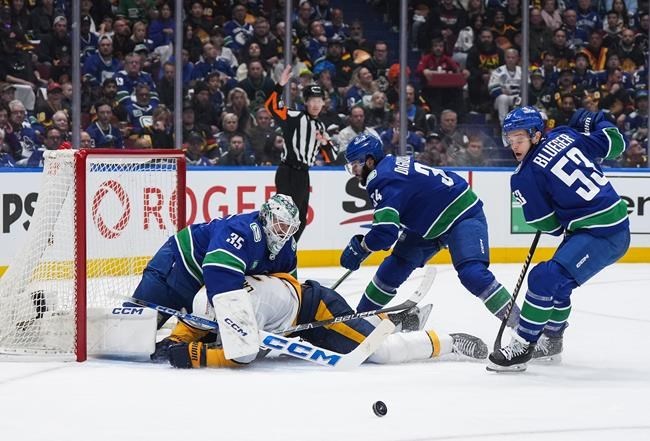NASHVILLE — Rick Tocchet expects boos to rain down when his Vancouver Canucks take the ice on Friday.
That's exactly how it should be, the head coach said.
The Canucks will be in hostile territory as their first-round playoff series with the Predators shifts to Nashville for Game 3. Being the despised opponent is a role players should relish, Tocchet said.
“I love getting booed," the former NHL forward said. "Nashville’s got great fans, they don’t throw stuff at you. Sometimes it’s nice to be the villain with somebody booing you. I think it brings out the best in certain guys. So use it to your advantage.”
The Canucks head to Tennessee with the series tied at 1-1 after the Predators won Game 2 on Tuesday.
Vancouver took a pair of victories in Nashville during the regular season, but the atmosphere inside Bridgestone Arena is sure to be different come playoffs.
“You know it’s going to be loud, you know they’re going to be on top of you. They’ve had some big playoff games here before,” said forward Teddy Blueger.
“We expect it to be rowdy and loud. It could be challenging at times, but I think we need to embrace that, stick together and do a good job supporting one another.”
The first five minutes of Game 3 will be key, Tocchet said. The coach wants his team to start with a smart game where they get a good hit or a good shot in while settling into the rhythm of play.
“If you look at the coach’s handbook, everything says simplify,” he said. “And if nothing exciting happens on your shift, that’s OK. You don’t have to press the issue at the start.
“And stay disciplined. Sometimes when the crowd’s loud, you tend to get over juiced and take penalties. So I think staying disciplined is a big key, too.”
Frustration crept into Vancouver’s play during Game 2 when the Canucks struggled to get shots on net. The home team had 84 shot attempts but saw the Predators block 33 of them and another 33 miss the net.
Elias Pettersson dropped to his knees in apparent disbelief late in the first period when he got a golden opportunity on a mostly empty net, only to see his shot skitter off the outside of the post.
The star centre bobbled pucks several times in Game 2 and failed to register a single shot on net.
“I'm always my biggest critic and I take a lot of blame for this (loss),” he said afterward.
Part of the struggles come from Pettersson experiencing his first real playoff series, Tocchet said.
The 25-year-old forward played during Vancouver’s post-season run in 2020, but the games took place in the Edmonton bubble, away from the noise — and eyes — of a live crowd.
“(Pettersson’s) a young kid. This is his first taste of pressure playoff thing,” Tocchet said after Game 2.
“He’s got to learn. He’s got to dust himself off and be ready for Game 3. He’s got to be decisive with the puck. He’s got to take it. But I think he’ll be fine. This is good for him, a good learning lesson.”
The way to deal with frustration in the playoffs is to stay level-headed, said Blueger, a veteran of 26 playoff games who won the Stanley Cup with the Vegas Golden Knights last year.
“In these environments where the crowd is going nuts, especially on the road, it’s easy to let the emotions get the best of you. And I think once that happens, you lose your game and it’s hard to play at your best,” he said.
“So I think it’s just retaining your composure and staying focused on the task at hand. You’ve just got to focus on your next shift and then build momentum and create chances.”
If the group can weather the challenge of a tough road matchup, it will be an experience they can lean on going forward, Blueger added.
“I think sometimes that can kind of galvanize the group and bring us closer together, just because everyone’s rooting against us and on top of us and things like that,” he said. “When you have success in an environment like that, I think that kind of bands everyone closer together.”
This report by The Canadian Press was first published April 25, 2024.
Gemma Karstens-Smith, The Canadian Press
